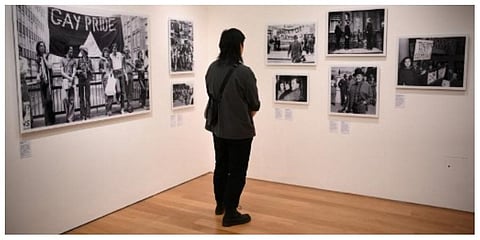

LONDON: Queer Britain, the UK's first LGBTQ+ museum, opened its doors in London this week, promising to bring the history and culture of the community to a wider audience.
Housed in a 19th-century building in a redeveloped area behind King's Cross railway station, the museum has been four years in the making and is entirely financed by private donations.
A major exhibition is slated for the coming months combining photos, artworks and costumes. Visitors can already discover the history of the community in the UK, from cross-dressing Victorians to more recent Pride marches.
Pioneers honoured include racing driver Roberta Cowell, thought to be the first British trans woman known to have had reassignment surgery, and Justin Fashanu, the first professional footballer to publicly acknowledge he was gay.
Fashanu -- who in 1981 became the country's most expensive black player when he made a £1 million move from Norwich City to Nottingham Forest -- killed himself in 1998, eight years after coming out.
One of the museum's managers, Stephanie Stevens, said Queer Britain was "a permanent place for us to be able to celebrate who we are, the amazing contributions we've made to history, and then to educate the nation so that they know about those contributions as well".
"We want to reach everyone," regardless of gender, sexuality or identity, Stevens told AFP.
"It's important to have this museum and this space because as queer people we are so often expected to be grateful for the crumbs off the table."
The museum in the trendy Granary Square development, where barges once unloaded their goods from the Regent's Canal, is free, with the aim of widening the message.
Stevens described it as "all of those people who feel like their voices haven't been heard" and "the people that never heard those voices".